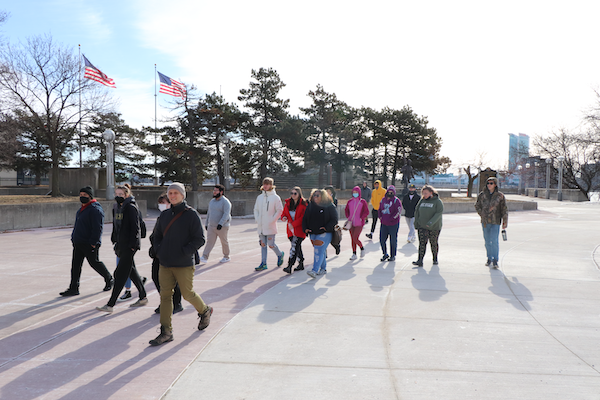"Borders and Crossings" courses give students off-campus, immersive opportunities

First Year Experience (FYE) courses are part of the curriculum for students entering UM-Flint with less than 25 credits. They are designed to help students become acquainted with the university and learn the skills and expectations needed to successfully engage in college-level work. This year, a series of special First Year Experience courses, funded by the Mellon Foundation, are doing this while also helping students get a broader perspective on the world around them.
These Mellon-sponsored FYEs, under the title "Borders and Crossings," merge the consideration of larger issues with on-site location visits. As a result, students get an in-depth look at the world outside of campus, while starting their college experience by making valuable faculty and peer connections. Such immersive experiences and connections with faculty and classmates are shown to support student success in college and beyond. And all costs–including transportation, meals, activities, and travel documents–are covered for students.
The following "Borders and Crossings" courses will be offered through the fall semester.
- Borders and Crossings: Anishinaabewakiing: Indigenous Michigan (Instructors: Emily Feuerherm and Vickie Larsen)
- Borders and Crossings: Walking on Water (Instructors: Mary Jo Gifford and Emma Davis)
- Borders and Crossings: I Need a Passport for That? Globalization in Michigan and Ontario. (Instructors: Jacob Lederman and Daniel Birchok)
Biochemistry major Syria Friend says that Borders and Crossings: Walking on Water gave her a new perspective on the city of Flint outside of the campus.
"My favorite aspect of this course was being able to go on trips and learn more about the resources UM-Flint has to offer," Friend said. "I believe this course lived up to its name because it was a great introduction into my first year of college. It not only taught me about UM-Flint, but it also taught me a lot about the city of Flint itself. Being an out-of-state student, this course was very helpful and well needed."
Read more about the course offerings, and watch this video for more information.
Borders and Crossings: Anishinaabewakiing: Indigenous Michigan
This course brings together students from UM-Flint and the Saginaw Chippewa Tribal College in Mt. Pleasant to learn about the history and cultures of indigenous peoples in Michigan. Students will visit some of Michigan's most important indigenous sites. The curriculum includes the art, literature, music, and ceremony of Michigan's indigenous peoples, and the cultural effects of settler religion, education, and public policy.
"The instructors of this course both at UM-Flint and at the Saginaw Chippewa Tribal College believe that higher education helps us see clearly the histories and present circumstances of colonization and oppression in order to envision and build a better future for everyone," course instructor Vickie Larsen says.
Borders and Crossings: I Need a Passport for That? Globalization in Southeast Michigan and Ontario
Students in this course travel to Canada and Detroit to better understand our region's place in the world. While the course equips first-year students with college skills such as library research and study strategies, they will also engage with contemporary issues such as deindustrialization, immigration, and globalization.
"Quick spoiler, we'll be traveling to Detroit and Windsor, Ontario over fall break. Everything involved in that trip is free," instructor Jacob Lederman says. "We'll help you get an enhanced driver's license to travel to Canada and the university will even cover the cost."
Instructor Daniel Birchok adds that big ideas like globalization and the nuts and bolts of the college experience blend together seamlessly in the course.
"You might have heard that cities like Flint have lost factory jobs and fallen on hard times. But what you might not know is that these economic forces have impacted Canada as well," Birchok says.
Borders and Crossings: Walking on Water
This course explores the natural and human histories of rivers in the Midwest, using the St. Clair and the Flint Rivers as local case studies. Students will get to see rivers in person, but look at them through the eyes of indigenous peoples, explorers, settlers, entrepreneurs and industrialists, as well as vacationers.
Instructor Mary Jo Kietzman explains that exploring rivers is perfect for beginning a college journey.
"What better way to begin your university experience than by exploring local rivers with teachers and classmates who will become mentors and friends? You will travel to the places of knowledge and inspiration in the course. You'll walk stretches of the St. Clair on both the US and the Canadian sides," Kietzman says. "And just like the river that uses its accumulated sediment to make the largest freshwater delta in the world, you will use your accumulated learning and wisdom to build your own world and chart a course for success."
Student Angel Coutler says that the course allowed her to become more adventurous.
"I started to become more adventurous and learned more about my hometown of Flint," Coulter says. "Everything we've read and every assignment we've taken are all connected. Everything, in some way, is related to rivers and bodies of water. We occasionally went on walking trips as well."
How to Register
Students can register for these FYE courses when making their course selections for the Fall 2022 semester. If students have any questions about signing up, they can contact their academic advisor.
Related Posts
No related photos.
UM-Flint News
The Office of Marketing & Communications can be reached at [email protected].